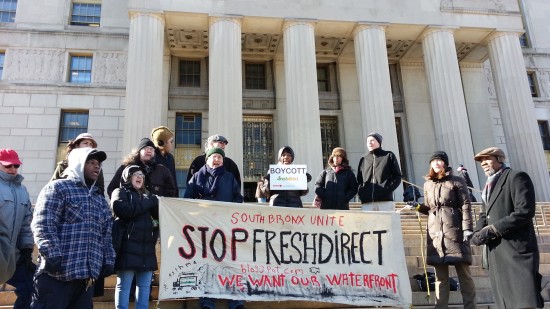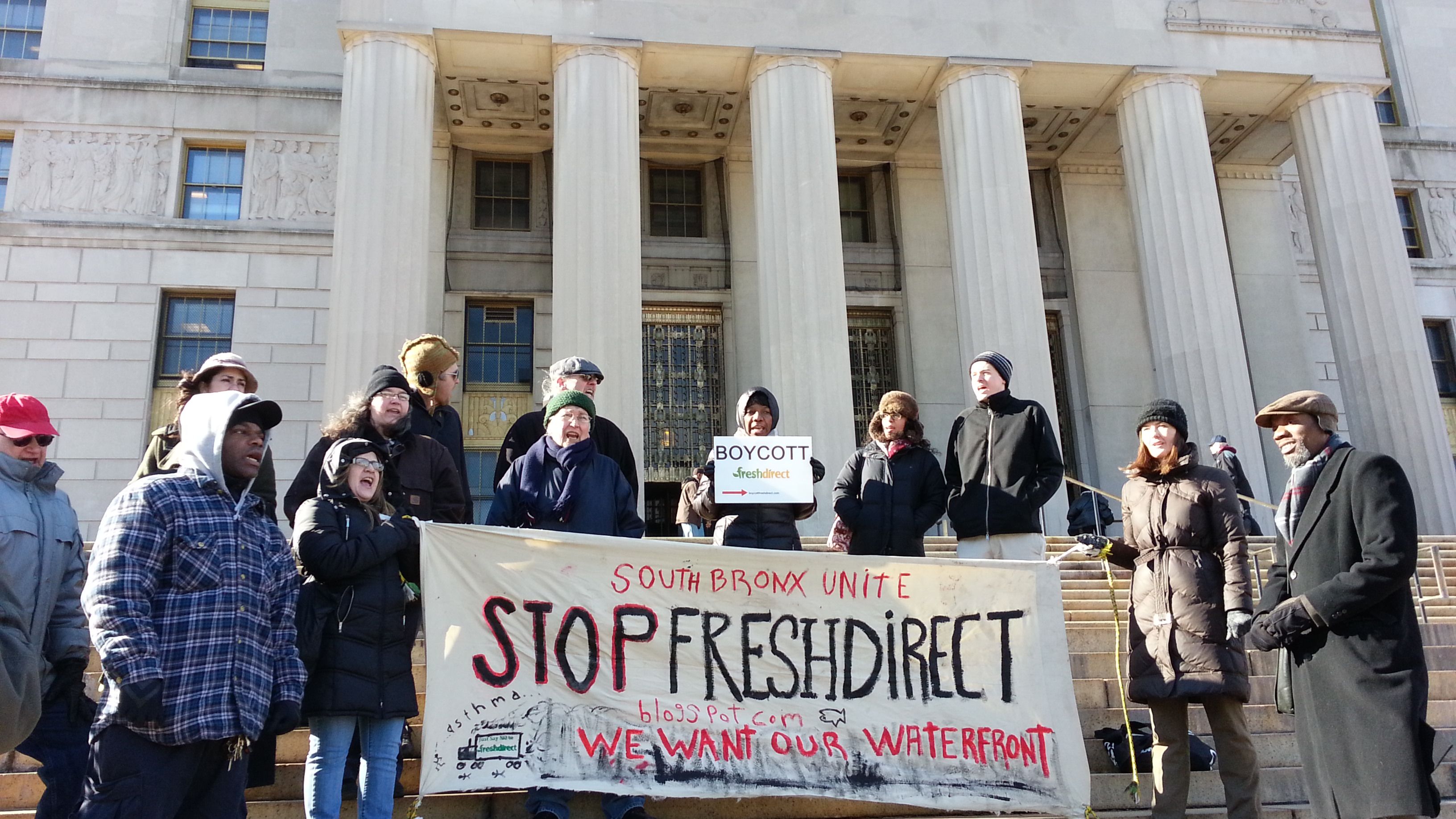South Bronx Unite, FreshDirect lawyers present opening arguments

Attorneys representing more than two dozen South Bronx residents in a lawsuit aimed at stopping online grocer FreshDirect from relocating to Port Morris, presented their case to a judge in State Supreme Court on the Grand Concourse on Monday.
The plaintiffs say the city and state should back off of their pledges to provide $130 million in tax breaks and subsidies to the company to entice it to move to the South Bronx from its Queens facility. They argue the state’s original agreement with the Galesi Group, the development company that manages the Harlem River Yards on which the parcel is located, called for a benefit to the community to stem from any plans along the waterfront, and contend FreshDirect would not benefit Mott Haven.
A lawyer told the judge, Mary Ann Brigantti-Hughes, that the 1993 deal called for a train line to be built on the parcel to help curb pollution from a waste treatment facility and other industries along the waterfront, but that just one waste-hauling train now uses that rail line.
Gavin Kearney, an attorney with the New York Lawyers for the Public Interest, which represents the residents, argued the Galesi Group has violated the terms of the 1993 deal, which was supposed to reduce truck traffic and improve air quality.
But an attorney for FreshDirect argued the rail line is used as intended, reducing truck trips by bringing paper to the New York Post plant and hauling garbage to and from a marine transfer station operated by Waste Management.
By contrast, South Bronx Unite, the umbrella organization that opposes FreshDirect’s move, says FreshDirect will generate more truck and car traffic, making health problems in Mott Haven worse.
“The biggest reason we don’t want them to move to the South Bronx is because the asthma rates are eight times the rest of the country,” said local resident Lille Smallwood at a rally on the steps of the courthouse before the hearing.
In a written statement, FreshDirect argued it will bring 1,000 new jobs to the neighborhood over the next decade, a third of which the company says would go to local residents. A brief from the company quoted members of six Bronx community groups who favor FreshDirect’s planned move to the waterfront.
Chris Norwood, founder of Health People, a South Bronx-based community health organization, contended a shortage of jobs is the primary trigger for Mott Haven’s health problems, not truck traffic or emissions.
“Unemployment is well documented as a major contributor to chronic disease,” Norwood’s statement said. “FreshDirect’s move to the Bronx will help fight chronic illnesses on two levels, decreasing unemployment and increasing availability to fresh, healthy foods.”
Kearney said the city’s Industrial Development Agency used an outdated environmental impact study to push the deal through, failing to take increased traffic into account. Many more residents live in the area now than when the study was conducted two decades ago, he told the Judge.
He added the environmental assessment underestimated truck trips, failing to account for the growing traffic its own projection of company growth would bring to the Harlem River Yards.
A representative for the Industrial Development Agency, Kathleen Schmid, contended her agency reviewed environmental impact statements for other, more recent projects in the area. FreshDirect would generate far fewer vehicle trips per day than Federal Express and the New York Post, both of which have plants at the Harlem River Yards, she said.
Members of South Bronx Unite, argued FreshDirect’s primary customers are in Manhattan, and that the waterfront parcel on which the company plans to build would better serve the community if developed as recreational space.
“With our vision of more green space, right there, that’s something that could prevent disease,” said Smallwood.
The judge adjourned the case after the two-hour hearing.
FreshDirect announced in its statement that it has already hired 75 Bronx residents, and would add 684 additional jobs when construction on the planned facility begins.
“We look forward to getting past the final hurdle so we can move forward with making the South Bronx our new home,” wrote FreshDirect CEO Jason Ackerman.


Sad, Chris Norwood never read anything form SBU on this issue and is out there shilling for a polluting company, not very health people, sad
[…] Morris, presented their case to a judge in State Supreme Court on the Grand Concourse on Monday. (Read Full) Posted in Community, Environment, Health, Politics and tagged with Air Quality, Bronx, […]
[…] and community organizations under the umbrella of grassroots group South Bronx Unite filed the lawsuit in 2013, contending that the deal between the city and FreshDirect violates the rail yard’s lease with […]